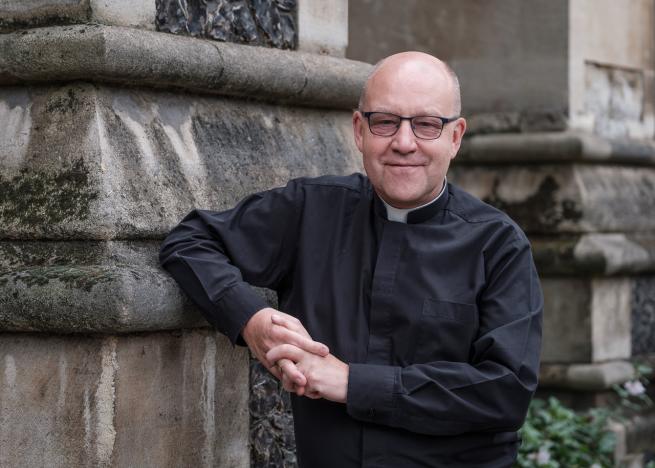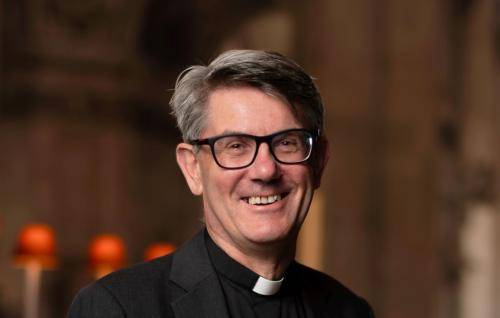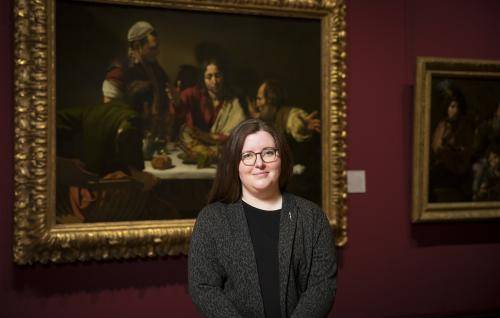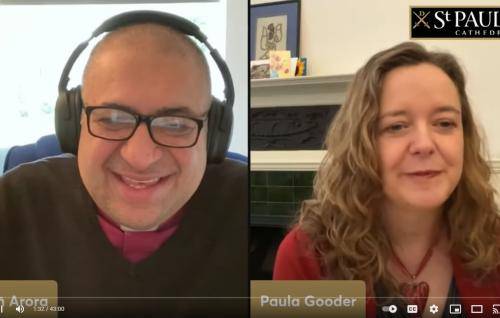Bethlehem Bound: An Advent Pilgrimage
Bethlehem Bound: An Advent Pilgrimage
Andrew Nunn reflects on the journey to Bethlehem this season of Advent.
1. Bearing Fruit: Leah the Matriarch
I used to love that moment each December on ‘Blue Peter’ when the presenters, in my day Valerie Singleton and the others, would make the Advent Crown. There was a lot of tinsel, a supply of metal coat hangers and some candles involved in the manufacture of it and they had the advantage of ‘one I made earlier’ pulled deftly from under the counter. But it helped me to understand that Advent was a time for counting down towards Christmas, for getting going on the journey to Bethlehem.
Southwark Cathedral is the successor to an Augustinian Priory which stood alongside the river, by the bridge which brought people to and from the City of London. Amongst those people were pilgrims, bound for Canterbury and the shrine of St Thomas Becket. These, often lone pilgrims, found companions for the journey in the inns and taverns of Southwark and Chaucer tells us all about that. In the shadow of what is now the Cathedral tower, they gathered and set off.
We make the Bethlehem journey with companions, and as we light the candles week by week on our Advent Crown we remember them, our traditional Advent companions on the pilgrimage to the birth of Christ: the Patriarchs, the Prophets, John the Baptist and Mary.
We begin way back in the story and the journey, with the fathers and mothers of the faith. In my Advent book, ‘Bethlehem Bound’, I have tried to imagine some of the companions. But I didn’t imagine the mothers, the matriarchs, those who first walked the path that Mary would tread.
So often we can overlook the women in the margins of scripture. Someone like Leah, one of Jacob’s two wives, along with her sister Rachel. Her story is told in Genesis 29.
I wasn’t his first-choice, I knew that. It was obvious he had eyes for my sister, for Rachel, and I knew why; she was beautiful and kind. But that evening my father led me to his tent and Jacob looked into my eyes. People said that my eyes were lovely, light and thoughtful. They were watching eyes. I saw what was going on around me, with my father, with Jacob, with Rachel. I wept – but in the end my eyes were bright with joy as my sons were born. I never thought I would hold a child, they never thought I would hold a child. But God blessed me. Even those they call barren can bear fruit.
God of blessing,
lead us to fruitfulness
and look on us in mercy.
Amen.
2. A Gift to Speak: Anna the Prophet
Those who set out from Southwark on the journey to Canterbury knew that it was going to be a potentially hard and dangerous one. So they took their minds off of it and told one another stories. In Chaucer’s famous account of the pilgrimage, the Wife of Bath, the Miller, the Reeve, all had a tale to tell, something to share that helped the journey along. Some people are like that, on a journey, pointing out what you are passing, sharing their views with you, setting out their plans and their hopes.
We are thinking in these weeks leading up to Christmas about those who are represented by the candles we light in the Advent Crown.
This week the candle is lit as a reminder of the prophets. A substantial part of the Bible is taken up with the words of the prophets. What they said then we take note of now. What they foretold then continues to bear fruit and speak truth into our today. We listen to what they said especially at times like this, in Advent, and as we approach the events of Holy Week and Easter. They have words that make sense of what we are witnessing, stories to help us on the journey.
At the end of the Christmas story we are introduced to another prophet. She has found herself in the New Testament rather than the Old, and yes, she is a woman, because prophecy is not a ministry restricted to men. When Mary and Joseph travel to Jerusalem to take the infant Jesus to the Temple in the second chapter of Luke, Anna is there, praising God.
Anna is my name, and you meet me as an old woman, 84 years old in fact, but with a mind as sharp as it was when my father Phanuel discerned that I had within me a spirit of prophecy. I had heard of all the great prophets, the men who spoke truth to power, but I hadn’t heard about the women. So my father sat me down and told me stories, of Miriam and Deborah and also of Huldah. I had never heard that name. She was Keeper of the Wardrobe for the King and like me she had within her the gift to speak God’s words. At one point she told the king that he wouldn’t be defeated by his enemies but that he would be gathered to his grave ‘in peace’. I loved that story. Now I am old I stand alongside another prophet, Simeon, waiting for God’s promise to be revealed so that he can pray ‘Now Lord let your servant depart in peace’.
God of prophecy,
speak your truth through us
that we may speak your peace
to the nations.
Amen.
3. Graced by God: Elizabeth, Mother of John the Baptist
There is one person who stands out from all the rest as being an Advent companion, though what kind of companion he’d make I am not really sure. Any group of pilgrims will have easy companions amongst them and those who, well, let’s say, are more challenging. Chaucer’s ‘Miller’ is anything but an easy character. Physically he’s stout and brawny, has a wart on his nose and a big mouth. When he gets his way in telling his tale it turns out to be blasphemous, ridiculing religious clerks, scholarly clerks, carpenters, and women, some of whom are amongst the party.
As we light the third of the candles on the Advent Crown we remember John the Baptist. Whilst he’s not like the Miller he doesn’t ever hold back in his criticism of people. If you were a soldier, or a tax collector or just a member of the crowd there was sting in the tail for you. John was a colossus; just as Anna who we thought about last week brought the Old Testament spirit of prophecy into the new, so does John, but on another scale. It is as though Elijah is back, challenging, upsetting. John is not the person to invite to your Advent supper with his strange diet, his unkempt appearance and his way with words; the table would be in uproar. Yet this is one of the companions on the journey as we are heading to Bethlehem, ‘Bethlehem Bound’ as I describe it in my new book.
But there is someone associated with John that we don’t hear much from, yet she has a part to play in this journey. The person is Elizabeth, John’s mother. She is nowhere near the desert where John is to be found, instead she is in the Judean hills, in a small town where she is still the talk of the neighbourhood. Her story is told in Luke Chapter 1.
They still look at me, you know, a sideways glance. Don’t get me wrong, they are pleasant, more than pleasant, friendly. But when I’m leaving the market with the food I need to prepare a meal for my husband Zechariah, I can feel them looking, hear them whispering. I’m not really fascinating at all, except for one small, maybe not so small, thing. We had given up all hope of having a baby. I was too old, that was the top and bottom of it, too old, barren, like a piece of useless wasteland. They looked at me then with pity. So when word got round that I was pregnant it wasn’t only my husband who was struck dumb! I called him John, that also disturbed their way of thinking, unsettled their conventions – but I had to, that’s what the angel had told us to do. John. Actually, that’s what you call him, but I called him Yohanan, and in Hebrew that means “graced by God.” My husband made up a song about him. “And you child, will be called the prophet of the Most High; for you will go before the Lord to prepare his ways”. My grace-filled baby, who brought grace and joy to my life – whatever the neighbours might think.
God of grace,
may we know your blessing
and be your blessing
in the world.
Amen.
4. Mary, Mother of God
We are almost there, the journey is almost complete. There is nothing like that feeling, when your destination is just over the hill, round the corner, and you will be there. Every pilgrimage, every journey has some conclusion, some destination in mind, a shrine, a purpose, a place.
We set out on this journey to get to Bethlehem, along with a great many other people. We’ve been counting the stages by lighting the candles on the Advent Crown and as we have lit the candle we have noticed who our companions have been – the mothers and fathers, the prophets, John the Baptist. We have been listening for voices and stories, just like those travelling from Southwark to Canterbury told their stories. For them it passed the time, for us it helps us understand why we are travelling, why we are making this journey, why we are following this way, ‘Bethlehem Bound’.
The person we remember as the fourth candle is lit is, however, no bit player in the drama of Christmas. Apart from the baby Jesus, who is the central figure, our companion also occupies a central place because we are remembering Mary, the Blessed Virgin Mary. She has been given so many titles over the centuries, more than her humility can bear – Mother of God, Ark of the Covenant, Mystic Rose, Star of the Sea – and there are many, many more. Yet we encounter her in the silence before the angel visited her, in that hidden life which even scripture has no insight into.
I sat by the well. My mother, Anne, had brought me here since I was a little girl, so little that she had to carry me as well as the water jar. So I knew the way to the well because we had to come here twice a day to draw water, early in the morning before the sun had risen and it was too hot to be out of the shade, and in the evening when the sound of the crickets was filling the warm dusk. But now I am on my own. I am no longer a child but I am not yet a woman. It feels to me as though I am in that no-man’s land of life, the in-between when we are waiting to become who God wants us to be. I’m too old to play but too young for the next stage of my life. I came to the well later today. ‘What will people think?’ said my mother in a slightly scolding way. ‘You know what they say about women who go to the well at midday’ she added. But I needed to be here on my own, without the gossip, without the laughter, without the screams of children playing with the water. I needed to be able to listen in the quiet of the midday, mid-time. I sat with the empty jar at the edge of the well. I would just wait, in the silence, expectant, but for what? ………………. Then I heard it - ‘Mary’ - and there was a flutter of feathers and wings.
God of silence,
may I listen for your voice,
for your breath in the air,
for your love in the breeze
for your life in my life.
Amen.








